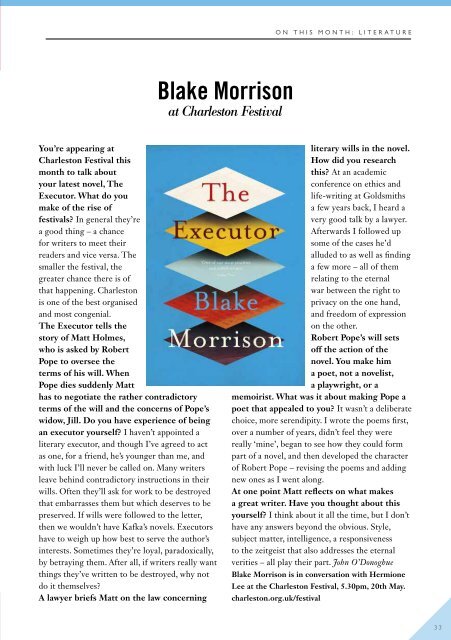Viva Lewes Issue #140 May 2018
You also want an ePaper? Increase the reach of your titles
YUMPU automatically turns print PDFs into web optimized ePapers that Google loves.
ON THIS MONTH: LITERATURE<br />
Blake Morrison<br />
at Charleston Festival<br />
You’re appearing at<br />
Charleston Festival this<br />
month to talk about<br />
your latest novel, The<br />
Executor. What do you<br />
make of the rise of<br />
festivals? In general they’re<br />
a good thing – a chance<br />
for writers to meet their<br />
readers and vice versa. The<br />
smaller the festival, the<br />
greater chance there is of<br />
that happening. Charleston<br />
is one of the best organised<br />
and most congenial.<br />
The Executor tells the<br />
story of Matt Holmes,<br />
who is asked by Robert<br />
Pope to oversee the<br />
terms of his will. When<br />
Pope dies suddenly Matt<br />
has to negotiate the rather contradictory<br />
terms of the will and the concerns of Pope’s<br />
widow, Jill. Do you have experience of being<br />
an executor yourself? I haven’t appointed a<br />
literary executor, and though I’ve agreed to act<br />
as one, for a friend, he’s younger than me, and<br />
with luck I’ll never be called on. Many writers<br />
leave behind contradictory instructions in their<br />
wills. Often they’ll ask for work to be destroyed<br />
that embarrasses them but which deserves to be<br />
preserved. If wills were followed to the letter,<br />
then we wouldn’t have Kafka’s novels. Executors<br />
have to weigh up how best to serve the author’s<br />
interests. Sometimes they’re loyal, paradoxically,<br />
by betraying them. After all, if writers really want<br />
things they’ve written to be destroyed, why not<br />
do it themselves?<br />
A lawyer briefs Matt on the law concerning<br />
literary wills in the novel.<br />
How did you research<br />
this? At an academic<br />
conference on ethics and<br />
life-writing at Goldsmiths<br />
a few years back, I heard a<br />
very good talk by a lawyer.<br />
Afterwards I followed up<br />
some of the cases he’d<br />
alluded to as well as finding<br />
a few more – all of them<br />
relating to the eternal<br />
war between the right to<br />
privacy on the one hand,<br />
and freedom of expression<br />
on the other.<br />
Robert Pope’s will sets<br />
off the action of the<br />
novel. You make him<br />
a poet, not a novelist,<br />
a playwright, or a<br />
memoirist. What was it about making Pope a<br />
poet that appealed to you? It wasn’t a deliberate<br />
choice, more serendipity. I wrote the poems first,<br />
over a number of years, didn’t feel they were<br />
really ‘mine’, began to see how they could form<br />
part of a novel, and then developed the character<br />
of Robert Pope – revising the poems and adding<br />
new ones as I went along.<br />
At one point Matt reflects on what makes<br />
a great writer. Have you thought about this<br />
yourself? I think about it all the time, but I don’t<br />
have any answers beyond the obvious. Style,<br />
subject matter, intelligence, a responsiveness<br />
to the zeitgeist that also addresses the eternal<br />
verities – all play their part. John O’Donoghue<br />
Blake Morrison is in conversation with Hermione<br />
Lee at the Charleston Festival, 5.30pm, 20th <strong>May</strong>.<br />
charleston.org.uk/festival<br />
33


















